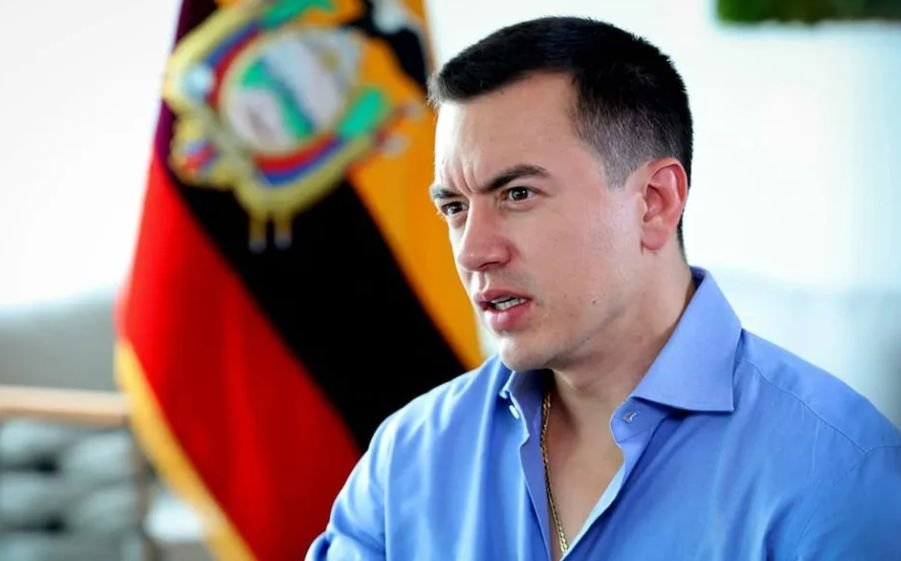Daniel Noboa

Daniel Noboa’s story does not fit the traditional mold of Latin American politics. Although he comes from a powerful business family in Ecuador — he is the son of Álvaro Noboa, a magnate and former presidential candidate — he has chosen to build his own path with a modern, less confrontational, and more technical vision. His passion for transforming the country from the ground up led him, at just 35 years old, to become the youngest president in Ecuador’s history, taking office in November 2023 after elections marked by public discontent and the need for renewal.
A young leader with business vision and global education
Before entering politics, Daniel Noboa devoted much of his life to preparation. He studied Business Administration at New York University (NYU), earned a master’s degree in Public Administration from Harvard Kennedy School, and another in Governance and Political Communication from George Washington University. His goal was never to collect diplomas for their own sake — Noboa understood that 21st-century Ecuador needed leaders with new tools for complex problems.
His education gave him a global perspective but also reinforced a local conviction: real change would not come from outside, but from within. This idea drove him to participate in public life, first in the private sector — at Corporación Noboa — and later as a member of the National Assembly, a position he assumed in 2021.
From the family business to public service
During his time in the National Assembly, Daniel Noboa did not seek media spotlight. Instead, he focused on initiatives related to innovation, youth employment, and sustainability — areas he knew well from his business background. His approach contrasted with the confrontational tone that dominated Ecuador’s legislature. Steering clear of political clashes, he worked to build bridges, which helped him gain a reputation as a consensus figure in a politically fractured country.
When President Guillermo Lasso dissolved the Assembly through the “muerte cruzada” mechanism in 2023, Noboa saw an opportunity — not to rise quickly, but to offer alternative leadership, detached from polarization and centered on security, employment, and technological innovation.
The presidential campaign: connecting through authenticity
During the presidential race, Noboa avoided grand rallies and bombastic promises. His campaign was close, direct, and free of messianic posturing. He used social media strategically, speaking with young people, small business owners, single mothers, and farmers. He did not sell unrealistic dreams — he offered steady work and tangible improvements.
His message resonated with an electorate tired of political conflict. Young voters — historically excluded from power — saw him as a genuine representative of their concerns. His second-round victory over Luisa González, the candidate from the correísmo movement, was not only unexpected; it was a clear statement. Ecuador wanted something different.
Passion for the country with a pragmatic approach
Noboa’s passion is not expressed through emotional outbursts, but through discipline. His leadership style in office shows a preference for surrounding himself with technical experts, combining business vision with statecraft, and avoiding ideological extremes. This does not mean he shies away from decisive action: he has advanced reforms in security, justice, and employment at a swift pace while maintaining dialogue.
His decision to declare drug trafficking an “internal armed conflict” marked a turning point. Unlike other leaders who resort to authoritarian measures, Noboa seeks to balance firmness with respect for institutions. For him, passion translates not into theatrical gestures but into an obsession with solutions.
Personal life: discretion and consistency
Daniel Noboa has kept his personal life private. He is married to Lavinia Valbonesi, an influencer and entrepreneur, and they have a son. While their relationship draws some media interest, Noboa has managed to maintain an image of accessibility without overexposure. The consistency he shows in public affairs is mirrored in his private life — measured, focused, and coherent.
A leadership still in the making
Noboa’s greatest challenges are still ahead. His term, shortened due to the exceptional circumstances of his election, serves as a testing ground for a new way of governing. His passion is not rooted in rhetoric but in the vision of a more functional country, where the state engages with citizens through efficiency rather than clientelism.
If he can maintain that vision and resist the pressures of the traditional political machinery, Ecuador could be at a turning point. What is clear is that with his arrival at the Carondelet Palace, Daniel Noboa opened a new political chapter — not because of his last name, but because of the way he chooses to exercise public service.
